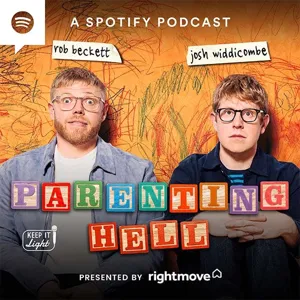Podcast Summary
Exploring the Challenges of Parenting with Celebrity Guests: Parenting is filled with challenges and uncertainties, even for famous parents. Sharing experiences and learning from each other can provide comfort and support.
Parenting comes with its fair share of challenges and uncertainties, even for famous parents. Rob Beckett and Josh Whittaker, hosts of the Parenting Hell podcast, discuss these trials and tribulations each week with a celebrity parent and listeners. They also share their own experiences, which can be relatable and funny. During one episode, they joked about Barack Obama's involvement in a children's show and the miscommunication that ensued. Despite the light-hearted banter, they acknowledged that parenting can be overwhelming and that everyone makes mistakes. They also highlighted the importance of support from family, friends, and communities. Overall, the podcast provides a platform for parents to share their stories, learn from each other, and find comfort in the shared experiences of parenthood.
Managing Chaos in Open Plan Living with Pets and Children: Adaptability and creativity are essential in managing unexpected distractions and chaos in open plan living spaces, especially when dealing with pets and children. Use clips or ponytails to keep long hair out of children's faces, and learn from impulsive decisions to avoid regrettable mistakes.
Open plan living comes with its challenges, particularly when it comes to unexpected distractions and the unpredictability of pets. The conversation between the speakers touched upon various topics, but a common theme emerged around the presence of a cat named Beryl and the chaos she brings to their open plan living space. The speakers also shared experiences about handling their children's long hair and the unexpected consequences of impulsive decisions. One of the speakers mentioned that Rose, who usually helps with childcare, was away, leaving them to manage on their own. While dealing with the chaos caused by Beryl, they also discussed how to manage their children's long hair when the fringe falls into their eyes. They suggested using clips or ponytails to keep it out of their children's faces. However, the conversation took an unexpected turn when they shared a story about the speaker's brother giving his daughter a drastic haircut using a beard trimmer. The speakers also shared their own experiences of regretting impulsive decisions, such as farting in their daughter's face. Despite the chaos and the unexpected turns, the speakers managed to find humor in their experiences and used them as opportunities to connect and share their parenting stories. Overall, the conversation highlighted the importance of adaptability and creativity in managing the challenges of open plan living and parenthood.
Adapting to Life's Challenges: Stay flexible and resourceful to overcome unexpected obstacles in life. Discovering a child's hat solved a sunscreen application problem, and other creative solutions emerged during the conversation.
Life can present unexpected challenges, and it's essential to adapt and find creative solutions. The speaker shared an experience of struggling to apply sunscreen to her child's head without disturbing her hair. After some time, they discovered the child's hat, which solved the problem. The conversation then moved on to other topics, including dealing with worms in the hair and the challenges of winter weather. The speaker expressed her dislike for January and her need for sunlight to feel her best. They also discussed their experiences with childcare and sleeping arrangements. Despite the various issues, they found ways to cope and make the best of their situations. Overall, the conversation highlights the importance of staying flexible and resourceful in the face of life's uncertainties.
Choices and Challenges in Travel: Travel involves making choices and facing challenges, from sleeping arrangements to dining etiquette. Stay adaptable and open-minded.
Even small decisions, like where to sleep, can be complicated and may involve considering various factors such as comfort, convenience, and family dynamics. The speaker shared an anecdote about choosing to sleep in a small space with her daughter instead of using a spare room, and the unexpected challenges that came with it. Another topic that emerged was the speaker's experience with dining etiquette and tipping, which led to an unexpected reaction from a young man they had met. Overall, the conversation highlighted the importance of being adaptable and open-minded, even in seemingly mundane situations.
Feeling Overwhelmed and Agitated: The speaker expresses frustration with modern life, discomfort with trends and behaviors, and a desire to cope with his agitation through mindfulness practices and spending more time in the sun.
The speaker expresses feeling overwhelmed and frustrated with various aspects of modern life, from social interactions to fashion trends and even the weather. He feels like he's becoming agitated and negative, especially during the winter months. The speaker also mentions his discomfort with certain trends and behaviors he encounters, such as people wearing hats indoors or carrying large walking sticks. Despite his attempts to stay positive, he feels drawn to arguing and conflict. The speaker acknowledges that others may be feeling the same way and that everyone has their own struggles. He expresses a desire to find ways to cope with his agitation, such as meditation or spending more time in the sun. Overall, the speaker's monologue reveals a sense of unease and discontent with the world around him.
Desiring Change and Happiness: We all crave new environments and experiences for personal growth and happiness. Despite challenges, it's essential to look forward to positive experiences and holidays.
Everyone, no matter their current situation or past experiences, can feel the need for a change and the desire for happiness in new environments. The speaker expresses his longing for sunshine and the possibility of moving abroad for a simpler life. He also acknowledges the judgment he's made about expats but now considers they might be on to something. Rosie Jones, a client, left a voice message requesting her message be played faster, giving permission for it to be sped up. She announced an upcoming tour and asked listeners not to bring children to her shows due to her explicit language. The speaker shared his own struggles, including tidying his daughter's room and dealing with a string of bad events he couldn't discuss. They both expressed feelings of depression and addiction to simple pleasures like tea. Despite their shared low moods, they acknowledged the importance of looking forward to positive experiences and holidays. Overall, the conversation highlights the human need for connection, growth, and the pursuit of happiness.
Rob's tea and caffeine addiction affects his communication style: Being aware of addictive behaviors and their impact on communication is essential for healthy relationships.
Rob has a significant addiction to tea and caffeine, which he consumes in large quantities throughout the day. This addiction has led him to experience anxiety and potential caffeine intoxication when he consumes between 8 and 10 cups a day. Rob's communication style with his friend Shell, who often makes him tea, was perceived as demanding and rude in a text message he sent during a busy morning. The text message led to a misunderstanding and an unpleasant response from Shell. It's important to remember that how we communicate, especially in written form, can have unintended consequences. Additionally, being aware of our own addictive behaviors and the impact they have on our relationships is crucial for maintaining healthy connections with others.
The Challenges of Performing New Comedy Material: Comedians face self-doubt, fear of failure, inner critic, and constructive criticism when performing new material. They need resilience, determination, and a support system to succeed.
Performing new material in comedy can be a challenging experience, filled with self-doubt and the fear of failure. The comedian in this conversation shared an experience of a difficult gig where the audience response was not as expected, leading to feelings of inadequacy and self-deprecation. They also discussed the inner critic that comedians face, which constantly tells them they're a waste of time and not good enough. Despite these challenges, the comedian acknowledged that there were funny bits in their new material and that it's a normal part of the process to receive constructive criticism and refine the material. They also highlighted the importance of having a support system and the challenges of balancing comedy with family life. Overall, the conversation underscores the resilience and determination required to pursue a career in comedy and the importance of staying focused on the craft despite setbacks.
The importance of enduring uncomfortable situations: Enduring uncomfortable situations, like having to wait to use the restroom or dealing with difficult parenting moments, can lead to personal growth and maintaining order in daily life. Societal expectations may influence our actions, but finding humor in the situation can help us persevere.
Sometimes, the most uncomfortable situations in life can only be resolved through enduring them, such as having to give in to the urge to use the restroom or dealing with difficult parenting moments. The speaker in this conversation acknowledges that these experiences can be challenging and frustrating, but they are necessary for personal growth and maintaining order in daily life. Additionally, the conversation touches upon the importance of cleanliness and the influence of societal expectations on our actions. Despite the hardships, the speaker remains determined to persevere and find humor in the situation.
Supporting Small Businesses: Rob and Josh provided encouragement and a platform for two small business owners to promote their businesses and reach a wider audience.
Both Rob and Josh provided support and encouragement to two small business owners during their podcast. Victoria, a mobile massage therapist offering manual lymphatic drainage massages, shared her business and the benefits of her treatments. She appreciated the opportunity to promote her business on the podcast and shared her website and Instagram handle for listeners. Gemma, a crochet designer, discussed her new coloring book and the positive response it has received. She asked for help boosting sales and shared her Instagram handle and Etsy shop. Both guests shared their experiences and the impact of their businesses on their lives. Rob and Josh showed their appreciation for small businesses and provided a platform for them to reach a wider audience.
Exploring Political Viewpoints and Encouraging Open Conversations: The What Most People Think podcast provides a unique perspective on topical comedy by addressing various political viewpoints and encouraging open conversations about a range of topics, featuring a diverse range of guests from across the political spectrum.
The What Most People Think podcast, hosted by Geoff Norkot, offers a unique perspective on topical comedy by addressing various political viewpoints. The show features a diverse range of returning guests from across the political spectrum, including Ramesh Ranganathan, Simon Evans, Katherine Ryan, Constantine Kissing, David Badiel, Andrew Doyle, and Al Murray. The discussions can range from light-hearted topics to more serious issues, with a balance of good points and cheap jokes. However, the podcast aims to get to the heart of what most people think, regardless of political affiliations. Additionally, the speakers in the podcast had some interesting observations. Mel Gedreich emphasized the importance of seeking medical help when necessary, despite the NHS's current challenges. Rosie Holt and Bryony Gordon shared their thoughts on the normalcy of certain conversations, with Rosie expressing her frustration about being asked to join a pub quiz team and Bryony finding it upsetting when a poignant use of a potato harmed someone's life. Bobby Seagull brought up the topic of normalcy again, expressing his concern about the lengthy guest donation's time spent in the bathroom during their recording sessions. Overall, the What Most People Think podcast offers a fresh perspective on topical comedy by addressing various political viewpoints and encouraging open conversations about a range of topics.



